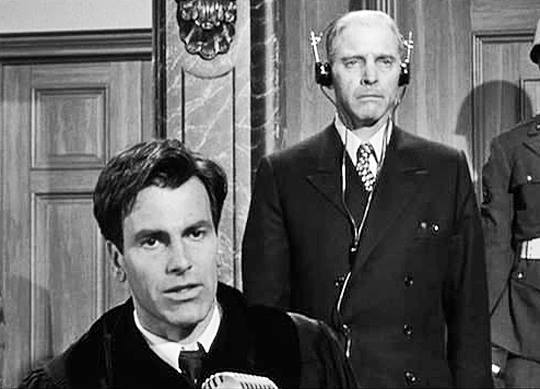 Judgment at Nuremberg
(1961)
Judgment at Nuremberg
(1961)
Academy Award for Best Writing, Adapted Screenplay (Abby Mann)
National Film Registry
Sølvklumpen for beste utenlandske kinofilmAward nominations: Academy Award for Best Actor (Spencer Tracy)
Academy Award for Best Art Direction, Black and White
Academy Award for Best Cinematography, Black-and-White (Ernest Laszlo)
Academy Award for Best Costume Design, Black-and-White
Academy Award for Best Director (Stanley Kramer)
Academy Award for Best Film Editing (Frederic Knudtson)
Academy Award for Best Picture (Stanley Kramer)
Academy Award for Best Supporting Actor (Montgomery Clift)
Academy Award for Best Supporting Actress (Judy Garland)Award details: (details at IMDb)
Below are links to reviews and further info from selected film sites. Links surrounded by a solid border lead directly to a page about this movie on that site. Links surrounded by a dashed border lead to a Google search for this exact movie title on that site. You may find it more efficient to open these links in separate browser tabs. Click Show More / All / Default to see more available links or return to the standard default selection. More (or fewer) choices of links can be selected via Options, and you can save your personal defaults (requires login).
Judgment at Nuremberg is a 1961 American drama film dealing with the Holocaust, with non-combatant war crimes against a civilian population, and with the post-World War II geo-political complexity of the Nuremberg Trials. The picture was written by Abby Mann and directed by Stanley Kramer, and stars Spencer Tracy, Burt Lancaster, Richard Widmark, Maximilian Schell, Werner Klemperer, Marlene Dietrich, Judy Garland, William Shatner, and Montgomery Clift. An earlier version of the story was broadcast as a television episode of Playhouse 90. Schell and Klemperer played the same roles in this version as well. Although touching on and discussing the war-time persecution and genocide of European Jews, the film's events relate principally to actions committed by the German state against its own racial, social, religious, and eugenic groupings within its borders “…in the name of the law…”, that began with Hitler's rise to power in 1933. The plot development and thematic treatment question the legitimacy of the social, political and alleged legal foundations of these actions.

